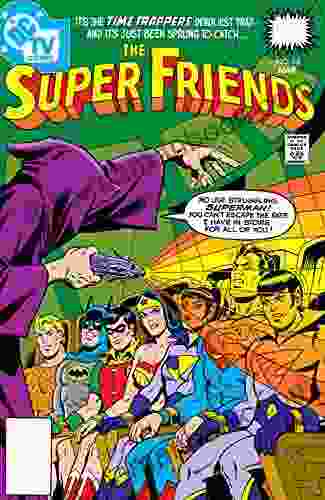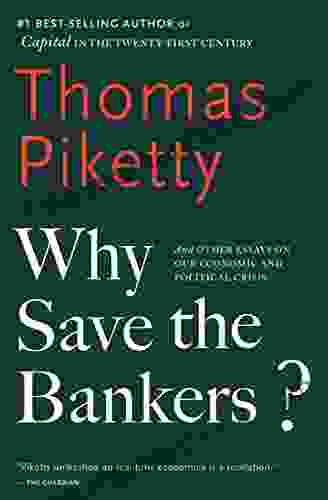Why Save the Bankers: The Complex Factors Behind the 2008 Bailouts

The financial crisis of 2008 stands as a watershed moment in economic history. The collapse of Lehman Brothers and the subsequent bailout of major banks by governments around the world sparked a fierce debate about the role of government intervention in the financial system.
One of the most controversial aspects of the bailouts was the decision to provide financial assistance to the banks that had played a major role in causing the crisis. This decision was met with widespread public outrage, with many people questioning why taxpayers should be forced to bail out the institutions that had created the mess in the first place.
4.2 out of 5
| Language | : | English |
| File size | : | 2801 KB |
| Text-to-Speech | : | Enabled |
| Screen Reader | : | Supported |
| Enhanced typesetting | : | Enabled |
| Word Wise | : | Enabled |
| Print length | : | 229 pages |
| Lending | : | Enabled |
In this article, we will explore the complex factors that led to the decision to save the banks. We will examine the potential consequences of allowing the banks to fail and the arguments for and against government intervention.
The Potential Consequences of Bank Failures
The failure of a major bank can have a devastating impact on the economy. This is because banks play a vital role in the financial system, providing loans to businesses and consumers and facilitating payments between different parties.
If a bank fails, it can lead to a loss of confidence in the financial system, which can in turn lead to a decrease in lending and economic growth. In the case of the 2008 financial crisis, the failure of Lehman Brothers led to a global credit freeze, which caused a deep recession.
The Arguments for Saving the Banks
There were a number of arguments in favor of saving the banks during the 2008 financial crisis.
- Preventing a Deeper Recession: The failure of major banks would have led to a loss of confidence in the financial system, which could have caused a deeper recession.
- Protecting Depositors: The failure of banks would have put millions of depositors at risk of losing their savings.
- Preventing a Systemic Crisis: The failure of major banks could have led to a systemic crisis, which would have threatened the stability of the entire financial system.
The Arguments Against Saving the Banks
There were also a number of arguments against saving the banks.
- Moral Hazard: Rescuing the banks would create moral hazard, encouraging them to take excessive risks in the future, knowing that they will be bailed out if they get into trouble.
- Unfairness to Taxpayers: Taxpayers should not be forced to bail out banks that have made reckless decisions.
- Delaying Recovery: Providing financial assistance to the banks could delay the recovery from the financial crisis by prolonging the period of uncertainty.
The Decision to Save the Banks
In the end, the decision to save the banks was made by governments around the world. The decision was based on the belief that the potential consequences of allowing the banks to fail were too great.
The bailouts were not without their critics, but they did help to prevent a deeper recession and a systemic crisis. However, the long-term consequences of the bailouts are still being debated.
The decision to save the banks during the 2008 financial crisis was a complex one, with no easy answers. However, the potential consequences of allowing the banks to fail were too great, and the bailouts ultimately helped to prevent a deeper recession and a systemic crisis.
Image Credit: World Bank
4.2 out of 5
| Language | : | English |
| File size | : | 2801 KB |
| Text-to-Speech | : | Enabled |
| Screen Reader | : | Supported |
| Enhanced typesetting | : | Enabled |
| Word Wise | : | Enabled |
| Print length | : | 229 pages |
| Lending | : | Enabled |
Do you want to contribute by writing guest posts on this blog?
Please contact us and send us a resume of previous articles that you have written.
 Top Book
Top Book Novel
Novel Fiction
Fiction Nonfiction
Nonfiction Literature
Literature Paperback
Paperback Hardcover
Hardcover E-book
E-book Audiobook
Audiobook Bestseller
Bestseller Classic
Classic Mystery
Mystery Thriller
Thriller Romance
Romance Fantasy
Fantasy Science Fiction
Science Fiction Biography
Biography Memoir
Memoir Autobiography
Autobiography Poetry
Poetry Drama
Drama Historical Fiction
Historical Fiction Self-help
Self-help Young Adult
Young Adult Childrens Books
Childrens Books Graphic Novel
Graphic Novel Anthology
Anthology Series
Series Encyclopedia
Encyclopedia Reference
Reference Guidebook
Guidebook Textbook
Textbook Workbook
Workbook Journal
Journal Diary
Diary Manuscript
Manuscript Folio
Folio Pulp Fiction
Pulp Fiction Short Stories
Short Stories Fairy Tales
Fairy Tales Fables
Fables Mythology
Mythology Philosophy
Philosophy Religion
Religion Spirituality
Spirituality Essays
Essays Critique
Critique Commentary
Commentary Glossary
Glossary Bibliography
Bibliography Index
Index Table of Contents
Table of Contents Preface
Preface Introduction
Introduction Foreword
Foreword Afterword
Afterword Appendices
Appendices Annotations
Annotations Footnotes
Footnotes Epilogue
Epilogue Prologue
Prologue Randy Brown
Randy Brown Genevieve Howland
Genevieve Howland Apryl Cox
Apryl Cox Pam Denicolo
Pam Denicolo Peter Gelling
Peter Gelling Shawn A Tassone
Shawn A Tassone Reyna Biddy
Reyna Biddy Robert D Putnam
Robert D Putnam Richard G Lewis
Richard G Lewis Arthur Joseph Jr
Arthur Joseph Jr Lucinda Race
Lucinda Race Christina Escamilla
Christina Escamilla G Victor Hallman
G Victor Hallman Christopher Willard
Christopher Willard Daniel S Lobel Phd
Daniel S Lobel Phd Tim Cooper
Tim Cooper David L Hough
David L Hough Rajat Acharyya
Rajat Acharyya Maria Isabel Sanchez Vegara
Maria Isabel Sanchez Vegara Yaswanth Nukasani
Yaswanth Nukasani
Light bulbAdvertise smarter! Our strategic ad space ensures maximum exposure. Reserve your spot today!

 Jeffrey HayesHow to Lose Belly Fat for Men: A Comprehensive Guide to Achieving a Leaner...
Jeffrey HayesHow to Lose Belly Fat for Men: A Comprehensive Guide to Achieving a Leaner... Justin BellFollow ·4.4k
Justin BellFollow ·4.4k Holden BellFollow ·15.5k
Holden BellFollow ·15.5k Michael ChabonFollow ·12.7k
Michael ChabonFollow ·12.7k Edwin CoxFollow ·15.5k
Edwin CoxFollow ·15.5k Ernest PowellFollow ·14.2k
Ernest PowellFollow ·14.2k Carlos DrummondFollow ·10.8k
Carlos DrummondFollow ·10.8k Wayne CarterFollow ·5.5k
Wayne CarterFollow ·5.5k Brennan BlairFollow ·10.7k
Brennan BlairFollow ·10.7k

 Dean Cox
Dean CoxHow to Make Decisions Easily & Effortlessly: The...
The Different Types of Decisions There...

 Gustavo Cox
Gustavo CoxThe End of World War II and the Birth of Baseball's...
The end of...

 Patrick Rothfuss
Patrick RothfussThe Dantes: An 11-Family Saga of Billionaires, Soulmates,...
The Dantes is an epic family saga that follows...

 Dylan Mitchell
Dylan MitchellSuper Friends: The Animated Adventures That Defined a...
In the vibrant landscape of American...

 Jamal Blair
Jamal BlairCollege For Students With Disabilities: We Do Belong
College can be a...
4.2 out of 5
| Language | : | English |
| File size | : | 2801 KB |
| Text-to-Speech | : | Enabled |
| Screen Reader | : | Supported |
| Enhanced typesetting | : | Enabled |
| Word Wise | : | Enabled |
| Print length | : | 229 pages |
| Lending | : | Enabled |












